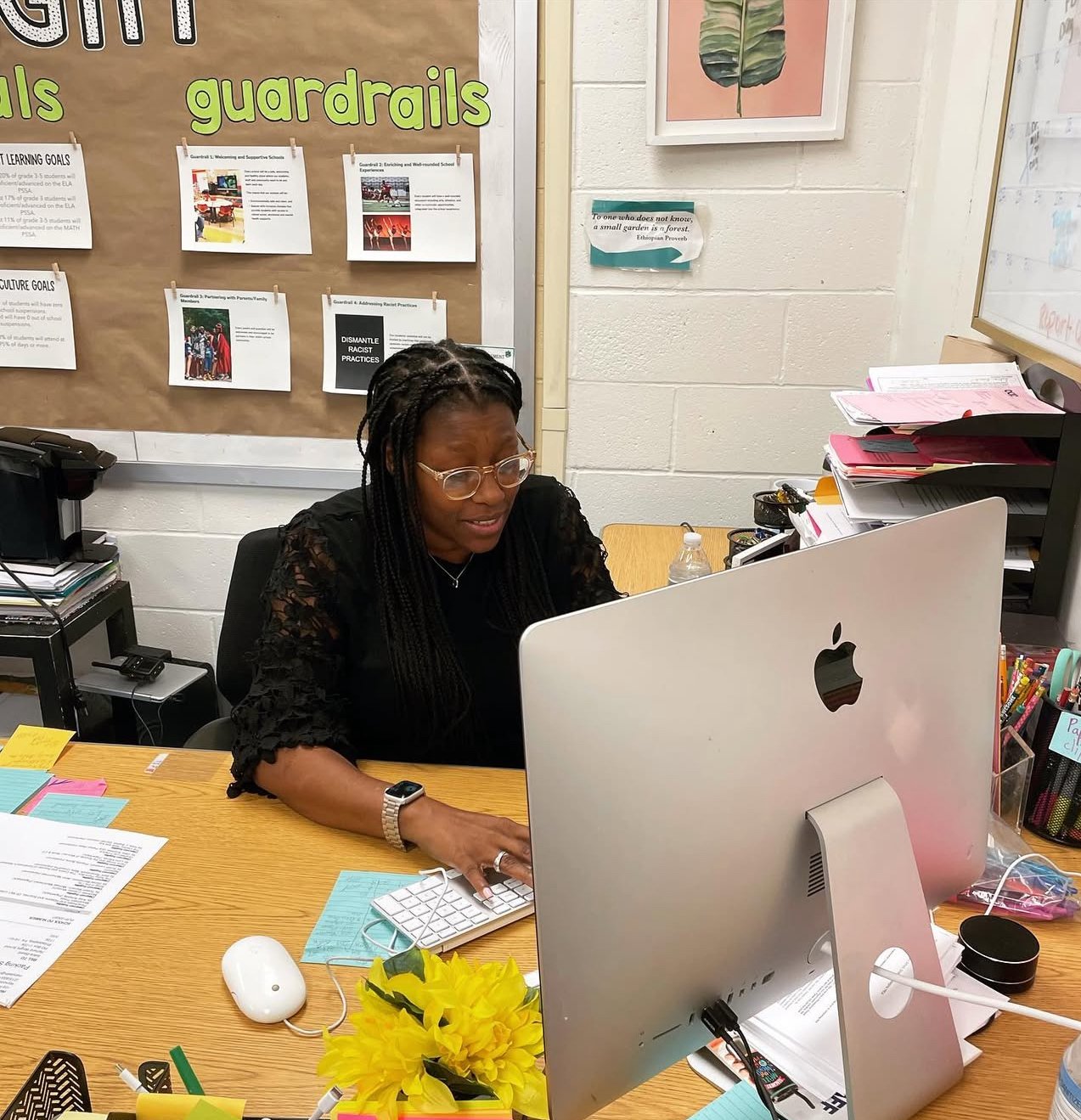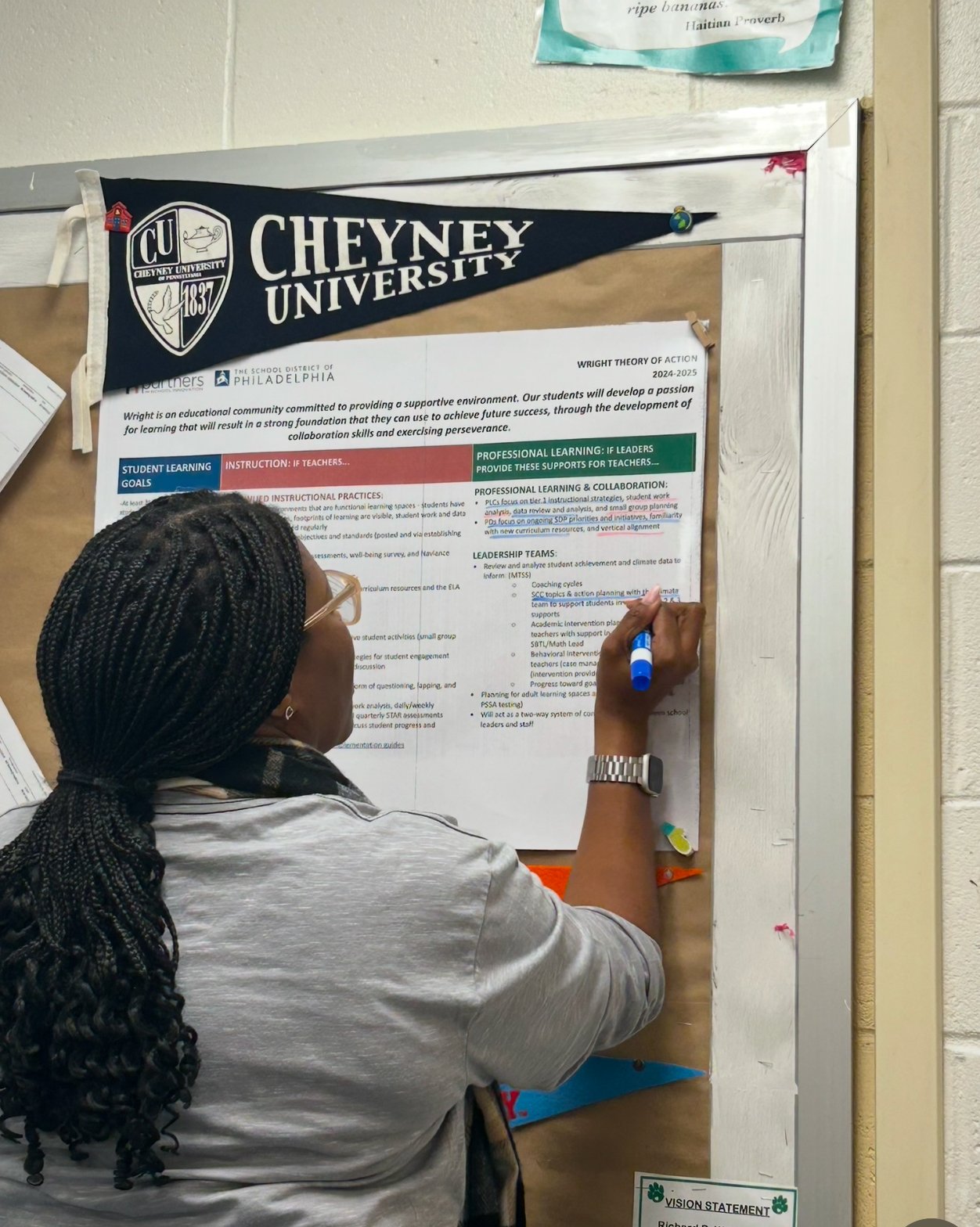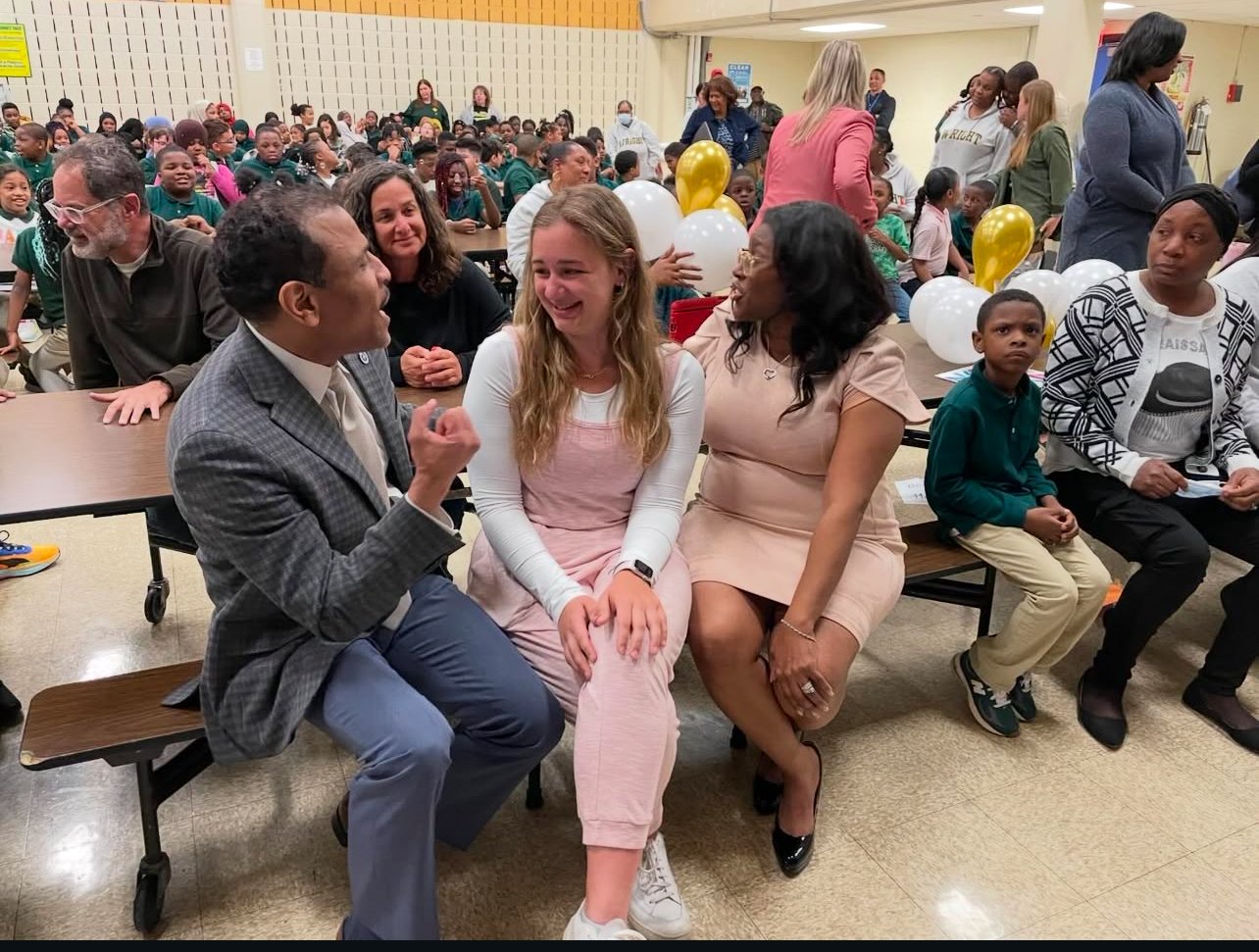Change Agent Spotlight: Principal Sakia Beard of The School District of Philadelphia
When Partners in School Innovation describes someone as a Results-Oriented Change Agent (ROCA), we mean a leader who embraces challenges, drives transformation, and is committed to every student’s success.
Principal Sakia Beard of Wright Elementary School in The School District of Philadelphia exemplifies this in every aspect of her work. Her leadership is grounded in empathy, equity, and determination, making a lasting impact on her school and community.
A Journey Driven by Advocacy and Care
A woman with long braided hair and glasses is working at a desk in a classroom or office space. She is typing on a keyboard in front of a large iMac. The desk is organized with yellow flowers, sticky notes, and papers. A bulletin board behind her displays the words "guardrails" along with educational materials. A framed green leaf print is on the wall.
Principal Sakia Beard’s path in education began after college, when her initial focus on mental health services in schools took a new direction. A principal who recognized Sakia’s talent encouraged her to pursue teaching, and with that early support, Sakia found her life’s calling.
Over the years, she’s worn many hats—first-grade teacher, school-based teacher leader, assistant principal—and has now been principal at Wright since 2016. Reflecting on her time there, she shared, “Just as much as I have invested in them, they have invested in me.”
Her connection with Partners for School Innovation has been pivotal. By adopting Results-Oriented Cycles of Inquiry (ROCI) and implementing vertical progressions, her school improved performance by 9%, moving out of the bottom 5% in the state.
Principal Beard credits the comprehensive coaching and transformational strategies from Partners, saying, “The work that they do is so valuable to me as a school leader.”
A Parent’s Heart, a Leader’s Vision
For Principal Beard, her work is deeply personal. Her motivation stems from her own experiences as a parent, and she views the children she serves as no different from her own.
“My children have had great experiences in schools, and I want that for the children I serve because, in the world, they are Black and Brown boys and girls. The world doesn’t see them any differently than the children I serve,” she explained.
Her oldest daughter’s academic success—earning a full scholarship for undergraduate and graduate studies—further fuels Sakia’s passion.
She attributes her daughter’s achievements to strong partnerships with teachers who provided timely support. “What I’ve always said to her is, you are no different than the kids that I serve. You are exactly the same.” These experiences as a parent guide her efforts to create equitable, opportunity-filled environments for her students.
A woman with braided hair and glasses is writing on a document pinned to a bulletin board using a blue marker. She is wearing a gray sweater, a black and white scarf, and a silver watch. The bulletin board is filled with various educational materials, including a Cheyney University pennant, a printed document outlining a "Wright Theory of Action," and a small sign with a Haitian proverb. The setting appears to be a classroom or school office.
Tools for Transformation
When asked what she could offer the community, Principal Beard highlighted two tools that have been instrumental in her school’s progress:
Theory of Action: A guiding framework that outlines school goals and defines what leaders, teachers, and students must do for success. Using visual strategies like heat mapping, the framework helps teams align efforts and reflect on progress. “That visual representation helps our leadership team focus and align our strategies,” Sakia shared.
Observation Tracker: A tool that provides consistent feedback by collecting and analyzing classroom data. This information helps the leadership team decide whether to focus on PLCs, individualized coaching, or other strategies. Sakia ensures that every teacher has uninterrupted PLCs and a dedicated 45-minute coaching session, all grounded in responsive teaching practices.
A Call for Community Support
Despite her school’s progress, Principal Beard faces ongoing challenges. One of her biggest struggles is fostering a growth mindset among her teachers. While they are well-intentioned, some resist fully embracing the belief that “every child can succeed.”
In a community where external barriers, like attendance issues, impact instruction, translating that belief into practice has been difficult.
Another challenge is engaging parents more deeply. “There’s a difference between parent participation and genuine engagement,” Sakia explained. She’s working to foster stronger buy-in from the community and increase meaningful parent involvement.
“I’m trying to transform this school community so that everyone believes that all children, regardless of their challenges, can succeed,” she said.
Principal Beard is reaching out to the educator community for ideas and resources to support her in these areas.
A school event in a cafeteria setting, with rows of students seated in the background. In the foreground, a man in a gray checkered suit is animatedly talking to a young woman in light pink overalls and a white shirt, who is smiling. Two women sitting next to them are listening attentively. The atmosphere is lively, with people chatting and balloons decorating the space.
Advice from Principal Sakia Beard for Aspiring Change Agents
We see you as a change agent – what advice would you give to those wanting to make an impact on education like you?
“Making an impact in education is a collective effort. This work is too complex and too important to be done alone. Lean on others, build a community of shared purpose, and create a space where everyone feels valued, affirmed, and empowered to contribute. You’ll find the journey is not only more effective but more meaningful when you walk it with others.
I also remind myself of two key guiding principles: ‘How do I make it equitable? How do I make it sustainable?’ These questions keep me centered on long-term impact and the well-being of every student and educator.”
We thank Sakia for her leadership, dedication, and passion for creating equitable educational opportunities. We are also deeply grateful to all the Change Agents out there who are making their mark on education and students' lives.
Join Sakia and over 600 equity-focused leaders in the Partners in School Innovation community, where resources and insights are shared weekly to support student success and school transformation.
Want to learn more about building effective systems for instructional improvement? Enroll in our free on-demand Change Management course today!



